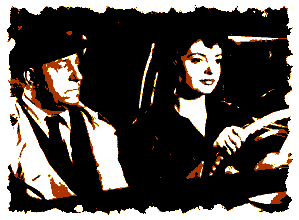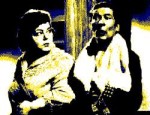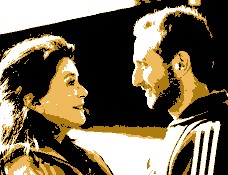Film Review

The shock pairing of an ageing Jean Gabin and a near-adolescent Nadja Tiller (paving the way for the former's subsequent liaison with Brigitte Bardot in En cas de malheur (1958)) is one of the things which makes this a memorable and enjoyable film. Gabin's loneliness and disillusionment with his life is apparent, as is Tiller's vulnerability and need to be loved. Despite their age difference, the two actors have a genuine rapport which provides the film with a feeling of humanity which is often lacking in French thrillers of this period. Although she plays a lesser role in the film, Danielle Darrieux is equally captivating when she finally appears.
Another defining characteristic of this film, and the thing which most gives it a sense of modernity and energy, is the almost omnipresence of jazz music - no doubt inspired by Louis Malle's Ascenseur pour l'échafaud (1958). Le Désordre et la nuit makes good use of its jazz star Hazel Scott, whose presence with her jazz troupe at various interludes in the film bring it to life with a vengeance.
© James Travers 2002
The above content is owned by frenchfilms.org and must not be copied.
Film Synopsis
Inspecteur Georges Vallois is called in to investigate the murder of Albert Simoni, the owner of a night club in Paris. The prime suspect is Lucky Fridel, a young German woman who came to Paris to start a career as a singer. Vallois is seduced by Lucky and ends up falling in love with her, although he discovers that she is a drug addict. Intending to protect Lucky from the police, Vallois pursues his own private investigation, realising that whoever is supplying Lucky with dope is very probably the person who murdered Simoni...© James Travers
The above content is owned by frenchfilms.org and must not be copied.
Similar Films
Here are some other films you may enjoy watching:- Compartiment tueurs (1965)
- Le Furet (1949)
- Tirez sur le pianiste (1960)
- Le Clan des Siciliens (1969)
- Cry Terror! (1958)
Other related links:
Film Credits
- Director: Gilles Grangier
- Script: Michel Audiard, Gilles Grangier, Jacques Robert (novel)
- Cinematographer: Louis Page
- Music: Henri Contet, Jean Yatove
- Cast: Jean Gabin (Inspecteur Georges Vallois), Danielle Darrieux (Thérèse Marken), Nadja Tiller (Lucky Fridel), Paul Frankeur (Inspecteur Chaville), Hazel Scott (Valentine Horse), Robert Manuel (Blasco), Robert Berri (Marquis), François Chaumette (Le commissaire principal Janin), Louis Ducreux (Henri Marken), Lucien Raimbourg (L'ivrogne), Gabriel Gobin (L'inspecteur Rocard), Jean Degrave (Le préparateur en pharmacie), Jacky Bamboo (Créole Combo), Harald Wolff (M. Fridel), Roger Hanin (Albert Simoni), Marcel Bernier (Le portier de 'L'Oeuf'), René Berthier (Le réceptionniste du 'George V'), Jean-Pierre Cassel (Un danseur), Pierre Collet (Un inspecteur), Amy Collin (La caissière)
- Country: France
- Language: French
- Support: Black and White
- Runtime: 93 min
- Aka: The Night Affair
The Carry On films, from the heyday of British film comedy

The very best of French film comedy

